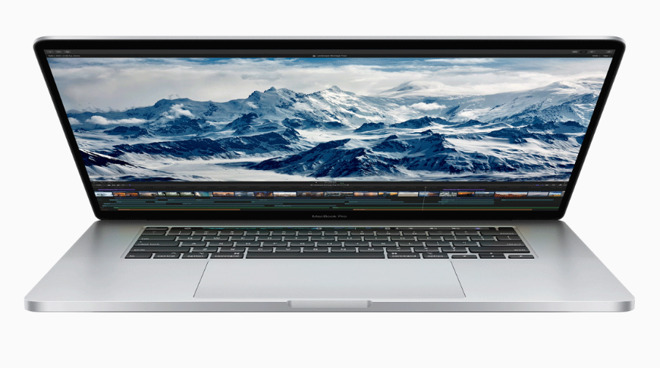The new 16-inch MacBook Pro has the best CPU performance yet -- but not by a lot
The new 16-inch MacBook Pro is Apple's most powerful notebook computer, with initial CPU benchmarks showing a small performance improvement compared to the the 2019 15-inch MacBook Pro.

The new 16-inch MacBook Pro
Apple's new 16-inch MacBook Pro is the top of the range for performance, but despite its overall improvements in features such as audio and video, its benchmark figures are similar to that of the now-discontinued 15-inch MacBook Pro from earlier this year.
Speed differences are based on AppleInsider data and all the submissions to Geekbench. We've based on the comparison on Geekbench data for the 2.4Ghz i9 version of the new MacBook Pro.
Averaging out the data, the new 2.4GHz 16-inch MacBook Pro model with i9 averages out at 1137 single-core and 7184 multi-core.
In our own testing, the mid-2019 15-inch i9 MacBook Pro in its 2.4GHz model scored 1104 single core and 6871 multi. The 2018 15-inch i9 MacBook Pro with a clock speed of 2.9 GHz got a single-core figure of 1081 and multi-core of 5302.
There is a considerable improvement versus the last year's model in the multi-core score, with the new MacBook Pro beating the 2018 one despite being 2.3GHz compared to our test machine's 2.9GHz. However, there's much less difference between the now discontinued 2019 15-inch MacBook Pro and its replacement, in regards to CPU power.
What this is not, is an indication of GPU power. Apple says that customers who choose the standard configuration of the MacBook Pro will see 2.1 times faster graphics performance than the previous standard configuration -- and there is an upgrade available for more money, and more speed. Actual performance increases will wait on further testing when we get one.
| 16-inch MacBook Pro i9 2.4GHz | 15-inch MacBook Pro i9 2.4GHz (2019) | 15-inch MacBook Pro i9 2.9Ghz (2018) | |
|---|---|---|---|
| Single Core | 1005 | 1104 | 1081 |
| Multi-core | 7184 | 6871 | 5302 |
CPU Benchmark scores do vary considerably depending on environment, with actual performance for any given user depending on what the machines are specifically being used for. Based on the CPU-centric benchmarks, the new 16-inch MacBook Pro is faster, but not dramatically faster than the 15-inch model it replaced.
It does, however, come with a new 16-inch display, improved audio and a new keyboard system in a case that is only marginally wider and thicker than the previous model.
Read on AppleInsider

Comments
Needs a Cinebench score or something that maxes out the CPU, since the biggest issue with the older design was throttling back due to thermal issues.
Single-core 1330
Multi-core 3217
Metal Score 6394
Apple A13 Bionic @ 2.66 GHz
CPU 1 processor 6 cores but not all cores full power
When I compare my iPhone to the i9 2.4GHz CPU the iPhone is significantly faster. Of course the MBP with its full power 8 cores is over twice the speed of the iPhone. With numbers like these from both Intel and Apple ARM, I can't wait to see what happens when Apple finally produces an Apple-ARM-based Mac laptop. It already has faster single CPU performance and can easily go higher once the size restrictions are removed. Actually, when you think about it, the new MBP has a native resolution of 3072‑by‑1920 compared to the iPhone's 2688‑by‑1242 so the A13 is driving a display that's not that much lower than the MBP.
AI, why didn't you include the Metal score? I searched for the "AMD Radeon Pro 5300M" and it's nowhere to be found.
Given the relatively low cost overall of an ARM chip, I would expect to see a notebook with both an A14X and an Intel chip next year. Definitely a challenge to get both chips in the same OS, but Apple could do it. I am reminded of the 68k to PowerPC switch.